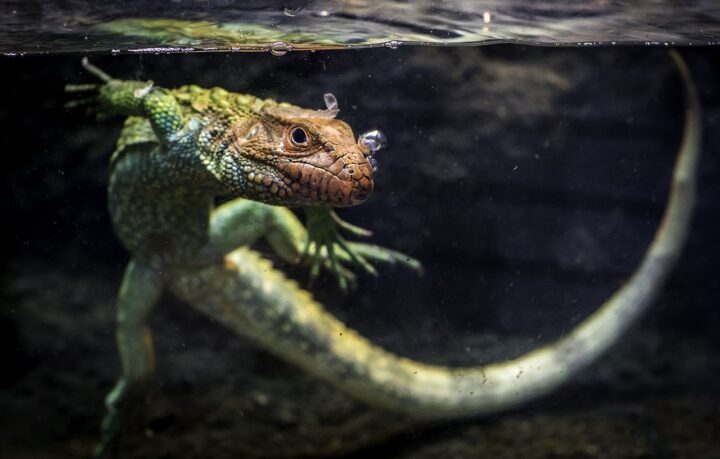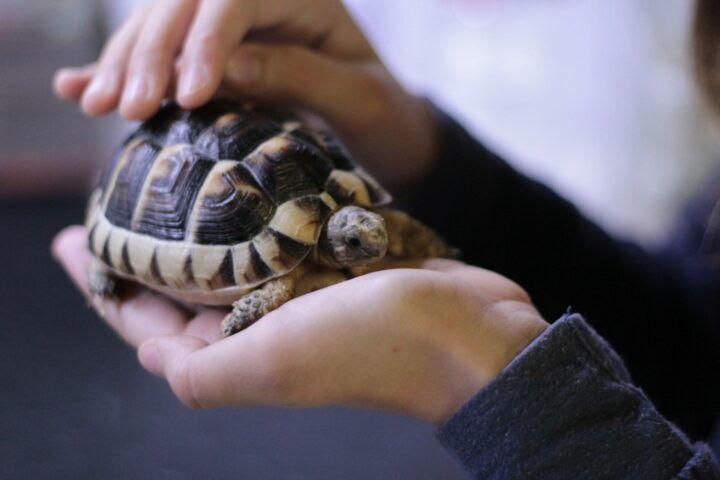Welcome to the captivating world of reptiles, where scaly creatures hold secrets that continue to astonish and challenge our perceptions. Today, we embark on a thought-provoking journey as we delve into the question: Can reptiles be trained or socialized in any way?
While the notion of training or socializing these enigmatic creatures may seem unconventional, prepare to have your assumptions challenged as we explore the intriguing possibilities that lie within the realm of reptilian companionship.
Can reptiles form meaningful connections with their human caregivers?
Reptiles may not express affection in the same way as more conventional pets but don’t be fooled by their stoic demeanor. These scaly companions can indeed form meaningful connections with their human caregivers.
Through consistent interaction, respect for their unique needs, and a patient approach, reptiles can develop a sense of familiarity and trust with their owners. By understanding their individual preferences and providing a nurturing environment, you’ll be amazed at the depth of the bond that can grow between you and your reptilian friend.
What are the primary factors influencing reptile socialization?
Reptile socialization is influenced by various factors that shape their behavior and interactions. Environmental conditions, such as temperature, lighting, and enclosure size, play a crucial role in their overall well-being and social development.
The availability of hiding spots, suitable enrichment activities, and a balanced diet also contribute to their socialization process.
Additionally, the species-specific traits, temperament, and previous experiences of the reptile can significantly impact their ability to socialize and adapt to human interaction. Understanding and addressing these factors can help create a conducive environment for successful reptile socialization.
Are certain reptile species more trainable or sociable than others?

While each reptile species possesses its own unique characteristics, it’s important to note that trainability and sociability can vary among individuals within a species. However, some species are generally more inclined to be trainable or sociable than others.
For example, certain types of lizards, such as bearded dragons and blue-tongued skinks, are known to exhibit a higher degree of sociability and responsiveness to training.
On the other hand, reptiles like snakes may be less inclined to engage in social interactions due to their more solitary nature. It’s crucial to research and understand the specific traits and tendencies of the reptile species you’re interested in, as it can greatly impact their potential for training and socialization.
How does a reptile’s natural behavior impact its socialization potential?
A reptile’s natural behavior serves as a foundation for understanding its socialization potential. Different reptile species have evolved distinct behavioral patterns, ranging from being more solitary to exhibiting social tendencies in the wild.
Understanding and respecting their innate behaviors is crucial when attempting to socialize them. For example, diurnal reptiles may be more receptive to social interaction during the day when they are naturally more active.
By observing and learning about the specific behaviors and needs of your reptile companion, you can tailor your approach to their socialization journey and enhance the chances of a successful bond.
Is it possible to establish trust between a reptile and its owner?
Trust is not solely reserved for warm and fuzzy animals; it can also be fostered with reptiles. Building trust with your scaly friend requires consistency, patience, and respect for their boundaries.
By offering a stable and secure environment, providing regular care, and maintaining a gentle and calm demeanor, you can gradually develop a sense of trust between you and your reptilian companion. Remember, trust takes time to cultivate, so approach the process with a compassionate mindset and an understanding that each reptile may have its own unique pace.
Can reptiles recognize their owners or respond to their presence?
Reptiles may not demonstrate recognition in the same way as mammals, but they are capable of associating their owners with positive experiences and responding to their presence.
Through consistent interactions and positive reinforcement, reptiles can develop an awareness of their owners and become more comfortable in their presence.
While they may not exhibit overt displays of recognition, subtle signs like increased activity, relaxed behavior, or seeking proximity can indicate that they do acknowledge and respond to their owners.
Are there specific techniques for training reptiles without causing harm?
Absolutely! Training reptiles can be a rewarding endeavor, and there are effective techniques that prioritize their welfare and well-being. Positive reinforcement is a key approach in reptile training, involving the use of rewards, such as favorite food treats or gentle praise, to encourage desired behaviors.
It’s important to avoid punishment-based methods that may cause stress or harm to the reptile. By focusing on positive reinforcement and utilizing patient, consistent, and reward-based training techniques, you can help your scaly companion learn new behaviors and strengthen your bond in a safe and ethical manner.
What are some common misconceptions about reptile socialization?

Reptiles often face misconceptions when it comes to socialization, stemming from misunderstandings about their behavior and capabilities. One common misconception is that reptiles lack the ability to form bonds or show any form of companionship.
However, reptiles are more complex than they are often given credit for, and with time, effort, and understanding, they can develop meaningful relationships with their human caregivers.
Additionally, some may believe that reptiles are inherently aggressive or untrainable, but this generalization overlooks the individuality and potential for positive social interactions within reptile species. Challenging these misconceptions is vital to promoting a deeper understanding and appreciation for the social lives of reptiles.
How does the environment affect reptile behavior and socialization?
The environment plays a crucial role in shaping reptile behavior and socialization. Factors such as temperature, lighting, humidity, and the layout of their enclosure can significantly impact how reptiles interact with their surroundings and their human caregivers.
For instance, providing appropriate hiding spots and enrichment activities can create a stimulating and comfortable environment that promotes exploration and social engagement.
Mimicking their natural habitat as closely as possible can also enhance their overall well-being and socialization potential. By carefully considering and optimizing the reptile’s environment, you can create a thriving space where they can thrive and develop their social skills.
Are there reptile-specific methods to encourage socialization?
Yes, there are specific methods that can be employed to encourage socialization in reptiles. One effective approach is gradual exposure and desensitization, where reptiles are gradually introduced to new experiences, sounds, and human presence in a controlled and positive manner.
This process helps reptiles become more comfortable and familiar with their environment and human interactions. Additionally, providing regular handling sessions, interactive playtime, and supervised exploration outside of their enclosure can promote socialization.
Reptile-specific methods often involve patience, consistency, and respect for the individual needs and boundaries of each reptile, allowing them to develop trust and form social connections at their own pace.
Can reptiles learn tricks or commands like other household pets?
Reptiles may not be commonly associated with tricks or commands, but they are indeed capable of learning and responding to certain cues and behaviors. Through positive reinforcement training, reptiles can be taught to associate specific actions with rewards, such as food treats or gentle praise.
For example, some reptiles can learn to respond to a hand signal for feeding or to come when called. While the range of tricks and commands may be more limited compared to traditional household pets, reptiles can surprise you with their ability to learn and engage in interactive training sessions.
What role does positive reinforcement play in reptile training?
Positive reinforcement is a fundamental aspect of reptile training, and it serves as a powerful motivator for desired behaviors. By rewarding reptiles with treats, praise, or other forms of positive stimuli when they exhibit the desired behavior, you reinforce their understanding that engaging in that behavior leads to a pleasant outcome.
This approach helps to build trust, strengthen the bond between the reptile and its caregiver, and makes the training process enjoyable for both parties. Positive reinforcement is a humane and effective technique that encourages reptiles to actively participate in their training, leading to successful outcomes and a more enriching relationship.
Are there risks involved in attempting to socialize reptiles?
While socializing reptiles can be a rewarding experience, it’s important to be aware of the potential risks involved. Reptiles have unique needs and behaviors that must be respected to ensure their well-being and safety.
Risks can arise from mishandling, improper enclosure design, or misinterpreting their body language and stress signals. Some reptiles may have specific temperaments that make them less inclined to socialize or tolerate human interaction.
It’s crucial to research and understand the specific requirements and limitations of the reptile species you wish to socialize. Seeking guidance from reptile experts or professionals can help mitigate risks and ensure a positive socialization experience for both the reptile and the caregiver.
Can reptiles benefit from interaction with other reptiles or animals?

Interaction with other reptiles or animals can provide various benefits for reptiles, depending on their species and temperament. Some reptiles are social creatures by nature and thrive in the presence of conspecifics (members of the same species).
Interaction with others of their kind can stimulate natural behaviors, provide companionship, and offer opportunities for social learning. However, it’s important to consider the specific needs and compatibility of reptiles before introducing them to others.
What are some success stories of socialized or trained reptiles?
| Reptile Species | Trainability | Socialization |
|---|---|---|
| Bearded Dragon | Highly trainable | Sociable and can form bonds |
| Leopard Gecko | Moderately trainable | Can become comfortable with handling |
| Ball Python | Less trainable | Tends to be solitary but can tolerate handling |
| Red-Eared Slider Turtle | Limited trainability | Can recognize their owner and show responses |
| Blue-Tongued Skink | Highly trainable | Generally sociable and responsive to socialization |
Success stories of socialized or trained reptiles are as diverse as the reptile kingdom itself. From the charming bearded dragon that eagerly greets its owner with a gentle head bob to the sulcata tortoise that follows commands like a well-trained dog, the possibilities are awe-inspiring.
There are tales of snakes that have become comfortable being handled, showcasing a level of trust and relaxation that defies their reputation. Some iguanas have learned to respond to their names, while leopard geckos have surprised their owners with their ability to be leash-trained for outdoor adventures.
These success stories illustrate the incredible potential for reptiles to form deep bonds and engage in meaningful interactions with their human caregivers. With dedication, patience, and a respectful approach, the journey of socializing and training a reptile can lead to extraordinary moments of connection and joy.
Final thoughts
In conclusion, the world of reptile socialization and training is filled with wonder and opportunity. While reptiles may possess different behaviors and temperaments compared to more traditional pets, they are capable of forming meaningful connections, learning new behaviors, and surprising us with their intelligence and adaptability.
By understanding their unique needs, respecting their boundaries, and utilizing positive reinforcement techniques, reptiles can thrive in human care and develop bonds that go beyond our expectations. Whether it’s a bearded dragon responding to its owner’s presence or a snake willingly being handled, these success stories highlight the potential for deep connections between reptiles and their human companions.
So, if you’re considering embarking on a journey of socializing or training a reptile, embrace the adventure and witness the transformative power of these scaly companions in your life.




